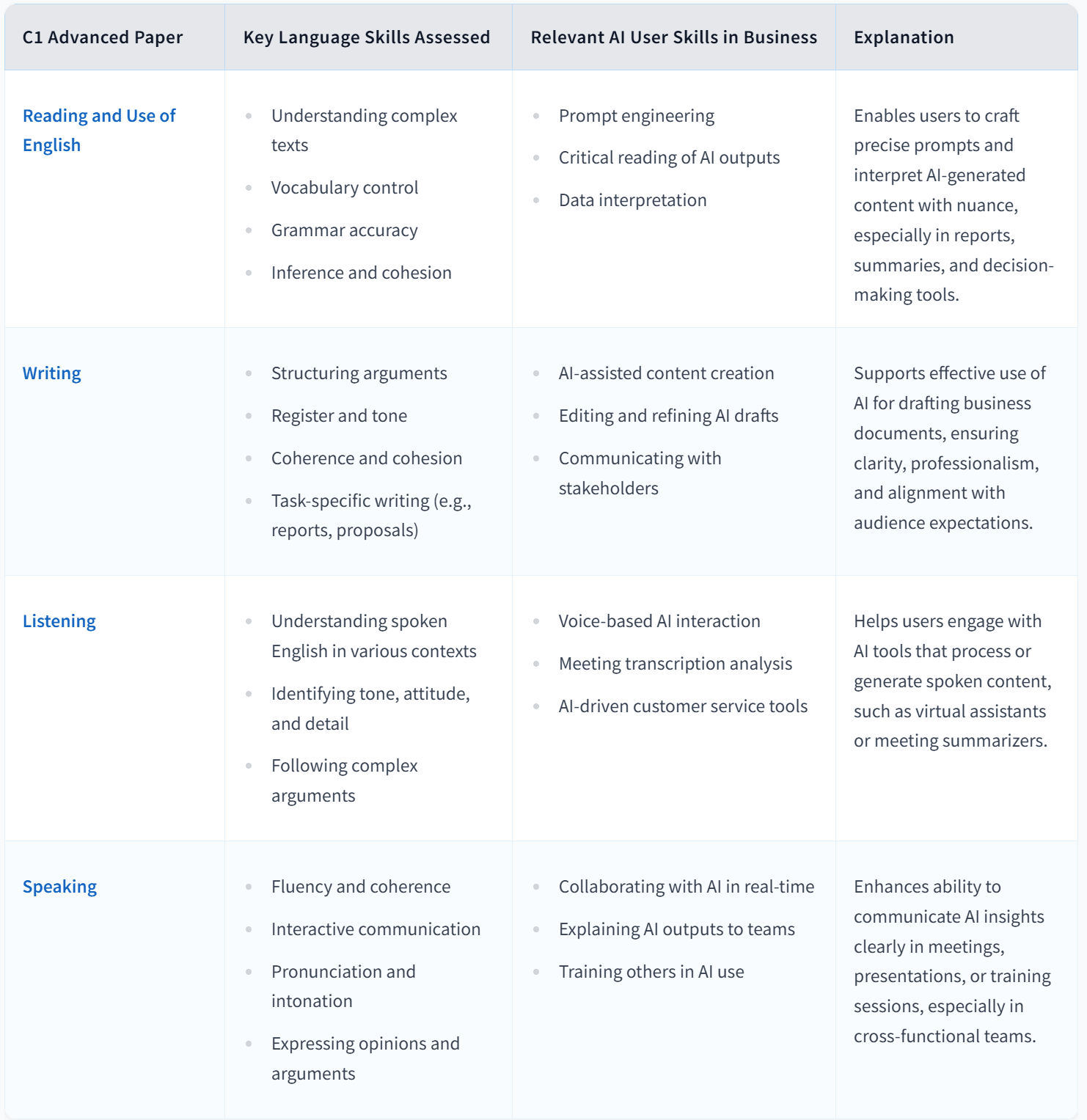In an era where artificial intelligence is rapidly transforming the business world, one human skill continues to shine as truly irreplaceable: advanced competence in the English language. Whether you’re crafting prompts for a cutting-edge language model, assessing proposals generated by AI, or communicating nuanced insights across multidisciplinary teams, your command of English—with its subtlety, clarity, and strategic precision—has never been more vital.
This article delves into the critical connection between achieving the Cambridge C1 Advanced qualification, a globally respected mark of high-level English proficiency, and the very skills that enable professionals to realise the full potential of AI in the modern workplace.
Why language matters in the age of AI
Today’s most influential AI tools—ranging from ChatGPT to Copilot and beyond—are fundamentally built on the architecture of language. The quality of any interaction with these systems is determined by the human user’s ability to frame clear, context-rich prompts, interpret and improve upon AI responses, and relay results to diverse teams and stakeholders. These tasks do not rely solely on technical prowess; they demand a blend of linguistic finesse and cognitive dexterity.
Interestingly, these human-centric abilities are closely aligned with the four core components of the Cambridge C1 Advanced exam. As such, this qualification has grown more relevant than ever for professionals navigating AI-driven environments.
Mapping the Cambridge C1 exam to AI competencies
Let’s explore how the skills tested in each area of the C1 Advanced exam translate into practical business advantages for AI adoption.
Reading and Use of English
Success in this section requires the ability to comprehend complex texts, interpret idioms and implied meanings, and exercise grammatical precision. In a business context, these same skills become indispensable for prompt engineering, where targeted and effective instructions are crucial for guiding AI toward desired business outcomes.
Moreover, the ability to detect subtle errors or implicit biases in AI-generated content is essential before such information is disseminated for decision-making. Finally, contextual awareness—gauging layered intentions within AI responses—ensures that the solutions derived are both relevant and reliable. For example, a well-crafted prompt such as, “Summarise this report for a non-technical audience, highlighting key risks and opportunities,” is far more likely to yield useful AI output than a vague or ambiguous request.
Writing
This component assesses logical structuring of arguments, adaptability of tone and style, and the capacity to express ideas with clarity and persuasion. These writing skills translate into the ability to produce original, emotionally resonant content—something AI still struggles to replicate with true authenticity.
Furthermore, ethical communication, such as selecting the right tone for sensitive or high-stakes contexts, remains a fundamentally human responsibility. Perhaps most critically, humans are needed to refine and edit AI-generated drafts, ensuring alignment with a company’s brand and maximising their impact. For instance, while AI can assemble a press release, only a human can confirm it accurately reflects brand values and avoids unintended connotations.
Listening
To excel in this area, one must understand spoken English in a variety of accents, and detect attitude, intent, and underlying meaning. In the realm of AI-powered business, these listening skills underpin emotional intelligence: interpreting tone and intent, whether in interactions with AI systems or in human-to-human communication about those systems.
Listening also facilitates collaboration across departments, especially between technical and non-technical colleagues. Additionally, the ability to absorb and translate stakeholder feedback into actionable improvements for AI systems is invaluable. When professionals can truly listen, they are equipped to turn diverse feedback into improved AI prompts and system enhancements.
Speaking
This area measures fluency, persuasive expression, and the capacity to engage in productive discussions using the appropriate register and intonation. In business, the corresponding competencies include dialogue management—guiding AI through complex, multi-step tasks using structured language—as well as leadership and influence, where articulate communication motivates teams and fosters change around AI adoption.
Training and onboarding also benefit from strong speaking skills, as leaders must clearly explain new AI tools and processes to their teams. A team leader launching an AI workflow, for example, must use confident and accessible language to guide and reassure colleagues through the transition.
Visualising the intersection: Language meets AI
To conceptualise this relationship, consider how each area of the Cambridge C1 Advanced exam aligns with essential human skills in an AI-powered business environment.
- Reading and Use of English skills underpin prompt engineering, critical evaluation, and contextual awareness.
- Writing enables creative expression, ethical communication, and the refinement of AI outputs.
- Listening supports emotional intelligence, collaboration, and feedback integration.
- Speaking empowers dialogue management, leadership, and the effective training of others.
Final thoughts
Advanced English proficiency is much more than a mastery of grammar and vocabulary. It is a way of thinking, communicating, and leading in a world where AI is a powerful enabler, but can never fully replace the insight and discernment that only humans possess.
For professionals aiming to thrive in tomorrow’s AI-enhanced workplaces, the skills demonstrated in the Cambridge C1 Advanced exam are not merely academic—they represent strategic assets, shaping and steering the future of business.
Mapping Cambridge C1 Advanced requirements to AI user skills in the world of work


